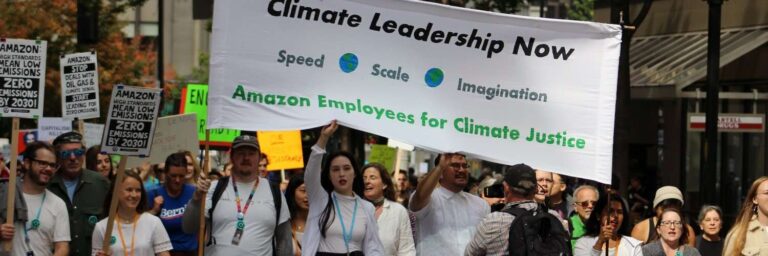Amazon announced in a press release on June 23, 2020, the creation of a $2 billion climate commitment fund to invest in new sustainable technologies and services.
Investment funds to move towards zero emissions
This new Amazon investment fund aims to support the company’s “zero net carbon emissions” goal.
It was mentioned in 2019 through “The Climate Pledge” project, representing a goal to be reached by 2040.
The $2 billion will be targeted at companies around the world, especially startups.
These funds will drive technologies forward.
They reduce greenhouse gases, whether in food, agriculture or energy production.
The aim is for the companies benefiting from these funds to be part of the “Climate Pledge” dynamic, and also to be carbon-neutral by 2040. 
Becoming carbon neutral
To become carbon-neutral, these companies need tools to reduce, offset or capture pollution.
The $2 billion will then be invested in innovations in transport, logistics, production, etc.
In the press release, Jeff Bezos confirms that “The Climate Pledge Fund will seek to invest in visionary entrepreneurs and innovators who are creating products and services to help businesses reduce their carbon impact and operate more sustainably […] Companies from around the world will be considered, from pre-product start-ups to well-established businesses. Each investment will be judged on its potential to accelerate the path to zero carbon. In this way, it will help protect the planet for future generations.
This is an important commitment on the part of the Seattle-based company, which has often been criticized for its own carbon emissions and for collaborating with major polluters such as Exxon Mobil.
This commitment follows an announcement by Jeff Bezos earlier this year that he will devote $10 billion of his own fortune to projects aimed at countering global warming.
An expected reaction
However, this announcement from Jeff Bezos’ firm doesn’t seem in line with the firm’s carbon footprint.
Amazon’s total carbon footprint increased by 15% in 2019 compared to 2018 according to the latest sustainability report.
A step in the right direction
This isn’t the first time Amazon has taken a step forward on environmental issues.
The company has also announced that it will run entirely on renewable energy by 2025 (pushing back the original target by 5 years).
Last year, Amazon was running on 42% renewable energy.
Also, in order to cope with energy-intensive cloud services, last month Amazon announced 5 renewable energy projects in China, Australia, Ohio and Virginia.
A lot of effort, but only a half-tone result…
Carbon emissions grew more slowly than net sales (the amount of carbon emitted for each dollar spent decreased).
Indeed, the 15% increase in Amazon’s carbon footprint in 2019 illustrates the challenge Jeff Bezos’s firm faces in achieving its goal of carbon neutrality.
The company claims to have emitted 51.17 million tonnes of carbon dioxide last year.
These figures correspond to 13 coal-fired power plants in one year.
In 2018 it had emitted “only” 44.4 million tons.
Amazon shared its carbon footprint for the first time last year.
Shareholders were pressuring the firm to make a deeper commitment to the fight against global warming.
These demands were made as part of the global climate strike.
Last May, a representative of the Amazon Employees for Climate organization criticized the company.
He called it “environmental racism” in a statement issued at a shareholder meeting.
Since then, the company has fired eight of the workers who criticized it.
For Todd Larsen, co-executive director of Green America, Amazon’s failure to specify that the $2 billion fund would focus solely on clean energy creates a lot of unknowns.
“It’s very difficult to trust Amazon. It’s not a transparent company and it’s not clear what it does. We also don’t know who is going to benefit and whether it would really be an environmentally friendly approach.” 
A challenge for Amazon
Amazon’s growing carbon footprint shows how difficult it is for a fast-growing multinational to reduce pollution.
The company relies on energy-hungry planes and trucks to ship its goods.
Also, orders soared during the coronavirus pandemic due to containment.
To keep pace, Amazon had to lease 12 Boeing … Léa Houël






















